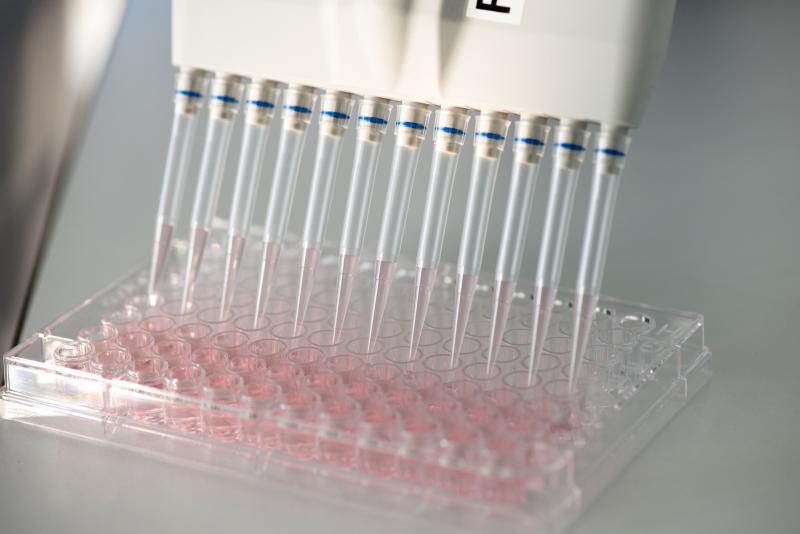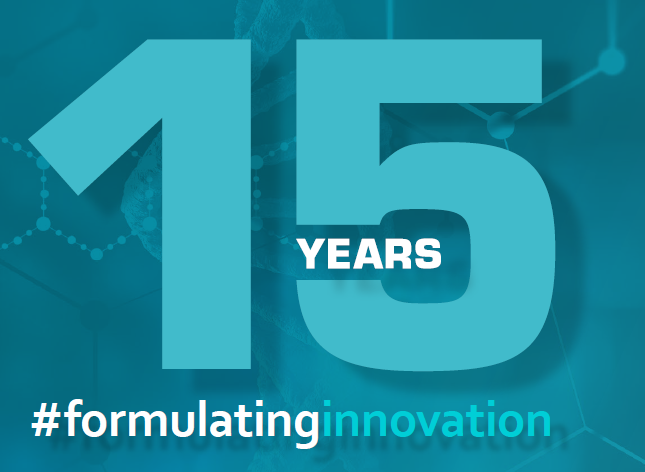Virus titration / TCID50 assay
Virus Titration for Samples up to Biosafety Level S2

Virus titration is an integral part of the development, manufacturing and quality control of virus products, including advanced therapy medicinal products (ATMPs). Coriolis offers a variety of methods to obtain virus titers. One option is to determine how many virus particles per volume are inside a sample (i.e. the physical titer). This is done by using particle characterization techniques - you can read more about that here. But such techniques may not tell the entire story, because the infectious or functional titer (i.e. how much virus can infect the target cell) is usually more important and meaningful and may not directly correlate to the number of virus particles in a sample.
TCID50 - A Common Assay Type
The number of infectious virus particles is frequently quantified by using the Median Tissue Culture Infectious Dose (TCID50) assay. The assay works by adding a serial dilution of the virus sample to cells in a 96 well plate format. The type of cell is specifically selected to show a cytopathic effect (CPE), i.e. morphological changes upon infection with the virus or cell death. After an incubation period, the cells are inspected for CPE or cell death and each well is classified as infected or not infected. Colorimetric or fluorometric readouts are also possible, which can increase assay sensitivity. The dilution, at which 50% of the wells show a CPE, is used to calculate the TCID50 of the virus sample. This calculation can generally be done by a variety of mathematical approaches, e.g., the Spearman-Karber method or the Reed-Muench method. Virus titer is expressed as TCID50 / ml.
Quality & Biosafety Level
We provide all our analytical services with the highest quality standards. Each project is carried out by experienced scientists and every report or data presentation is comprehensively checked by a scientific reviewer. We offer this technology with the following quality and biosafety level:
Other Biological Assays
Depending on the virus, the type of cells and the readout parameter indicating an infection, a variety of other virus titration assays are possible. For viruses that lyse the infected cell, for example, a plaque forming assay is commonly employed for quantification. The virus sample is added (in a suitable dilution) to a monolayer-forming cell culture and incubated over several days. Areas with infected cells will be visible as holes or plaques either by the microscopy, or by colorimetric or fluorometric staining. Virus quantity is expressed as infectious units (IFU) / ml or plaque forming units (PFU) / ml.
Our Services for Virus Quantification:
- Transfer, implementation and application of existing TCID50 assays
- Transfer, implementation and application of existing plaque forming assays
- Development of tailor-made virus titration / quantification assays
Standardized methods or dedicated method development
For common sample types, we can often apply standardized methods with little setup effort. On top of this, our experienced analytical scientists perform in-depth method development or method optimization tailored to your drug substance, product type and development phase. Under GMP, we also offer full method validation or compendial method verification.
Method development
During method development, we tailor sample preparation, method settings, and data analysis to the needs of your project and sample.
For this purpose, we include a representative sample and, where available, suitable reference standards and stressed/degraded materials. This way, our analytical scientists can design a method that is highly suitable for your needs, stability indicating, as well as robust and repeatable. Upon request, we compile a detailed method description for your records.
This can be applied under R&D and GMP. Read more
Method qualification
A method qualification is the initial assessment of the performance of an analytical procedure to show that it is suitable for the intended purpose.
During method qualification, our analytical scientists perform a documented testing that demonstrates that the analytical procedure meets certain acceptance criteria in several categories. These may include repeatability, linearity, intermediate precision, robustness and more. We compile a qualification plan and a qualification report including all relevant data.
This can be applied under R&D and GMP. Read more
Method validation
A method validation is the confirmation under highly controlled conditions that the performance of an analytical procedure is suitable for the intended purpose.
During method validation, our analytical scientists perform a documented testing, which demonstrates that the analytical procedure consistently produces a result that meets the pre-determined acceptance criteria. We compile a validation plan and a validation report including all relevant data.
This can be applied under GMP. Read more
Contact us
Contact us
For inquiries related to virus quantification assays please contact Dr. Jörg Müller
Phone: +49 89 41 77 60 – 111
Mail: joerg.mueller@coriolis-pharma.com


